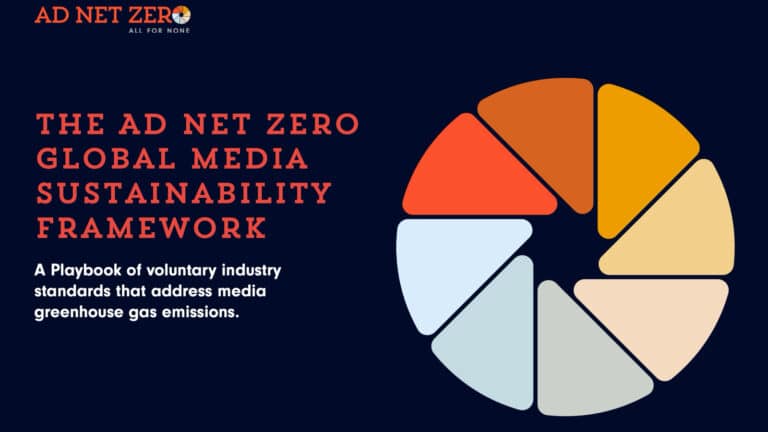Ad Net Zero has published the first major update to the Ad Net Zero Global Media Sustainability Framework (GMSF), establishing voluntary standards in greenhouse gas (GHG) emissions calculation and reporting for the advertising industry across six media channels – Digital, TV, OOH, Print, Audio and Cinema – with a clear methodology for brands to follow in their sustainability journey.
The updated framework has been developed with the support of leading global advertisers and the world’s six largest advertising holding companies, as well as major media owners, tech companies and trade associations.
The GMSF now includes significant updates to the digital methodology, covering formulae, data levels, and default values, developed by IAB Europe Methodology & Framework Working Group. This update also includes the formulae for Audio, Print, and Cinema channels which detail emissions from these channels.
The framework provides the advertising supply chain with a clear methodology for estimating GHG emissions from the six main media channels generated by ad spend, ensuring consistency and comparability.
The goal is to help advertisers and their partners, through a consistent industry-wide framework (GMSF), understand and take positive action to reduce the GHG impact of their media plans – directly supporting Action 3 of the Ad Net Zero Action Plan.
The development work for this update has been supported by the Responsible Marketing Advisory and guided by a Climate Science Expert Group including representatives from the 4A’s, BL evolution, BrainOxygen, Climate Impact Partners, DIMPACT, IAB Europe, ISBA, L’Oréal, LVMH, Media Sense, NC State University, Persefoni, and The Climate Registry. IAB Europe’s work was supported by its corporate members and National Federations, who collectively contributed their expertise to address current data gaps, align on guidance, and remove key estimation barriers in the digital space.
Sebastian Munden, Ad Net Zero Global Chair, said: “We believe tracking and calculation provide the best platform for reduction, helping to inform decisions which reduce waste without decreasing effectiveness. By doing this, we aim to make a significant difference to the carbon impact of the global advertising ecosystem.”
Dr. Bill Wescott, chair of the Climate Science Expert Group, said: “Having a framework that is transparent and consistent with existing climate standards is critical for advertisers who need to have reliable estimates of their advertising emissions, which surprisingly can be one of their top emitting activities. Advertisers need to have the same quality of data for advertising emissions as the rest of their GHG inventories which are increasingly part of regulatory and contractual compliance.”
Ad Net Zero has published v1.2 of the voluntary framework for open access here and is encouraging all interested parties to seek adoption at the highest level in their business and to ask the same of businesses up and down their supply chain.










